Businesses rely more and more heavily on digital data storage with each year. Whether this be automated online tax software, in-house financial data or your clients’ records, it is likely that your most valuable and sensitive information is being stored digitally.
Storing and processing data digitally has so many benefits, but it also comes with many new threats that paper records do not face.
Digital records are at risk of being stolen, destroyed, or manipulated in ways that paper records never were. In fact, with the right tools, your digital records are in many ways MORE at risk of being corrupted or stolen than paper records.
This is why it is so important to have a cyber security strategy in your business.
Without the right training, software, and contingency plans, your business records and your patient or client data are at risk.
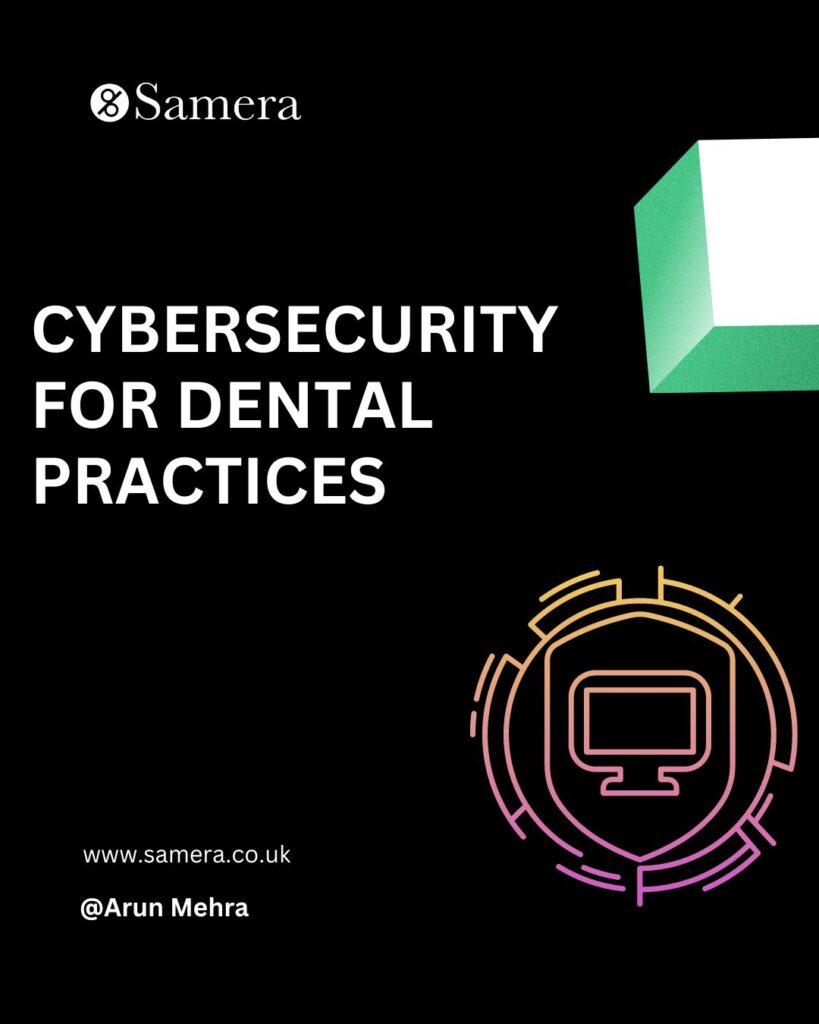
Is Your Dental Practice In Danger From A Cyber Attack?
The short answer is – yes.
Every business is at risk from cyber threats. However, patient-facing medical businesses like yours are prime targets for cybercriminals.
Not only do you hold your own financial data, but you also hold valuable patient records on your servers. These records can often be top-priority targets for cybercriminals for various reasons, such as identity theft and even corporate blackmail.
Because of this, dental practices like yours represent a jackpot to hackers and cybercriminals.
One of the biggest threats you face will be viruses known collectively as malware, such as ransomware. Ransomware is a malicious virus which automatically encrypts your data and makes it impossible to access unless you pay the criminal(s) a ransom.
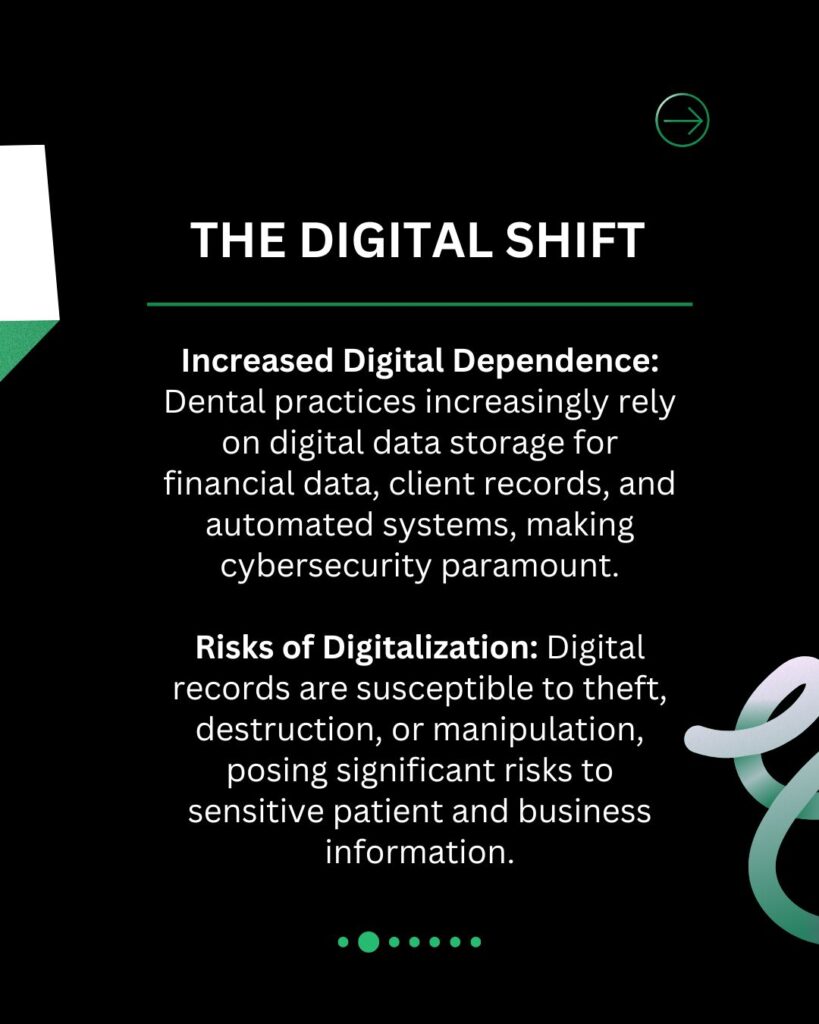
With our cyber threat training, antivirus software and regular backups of your entire data, we can make sure yours and your patient’s information isn’t held hostage or stolen by criminals.
- Do you have a cyber security strategy already implemented in your business?
- Are your team trained in how to recognise, respond to and solve cyber threats?
- Do you use endpoint protection, full disk encryption and dynamic threat defence?
- Do you have regular, secure backups for all of your financial and patient data?
If you answered ‘no’ to ANY of these questions, your practice is at risk.
You need a human firewall made up of your team, the right antiviral software, and you also need a safe and easily accessible backup strategy for your business to make sure that you are protected if anything should ever go wrong.
How to Protect Your Dental Practice Online
Even the biggest companies and institutions fall victim to cybercriminals. Think about the NHS cyber attack in 2017 and the chaos it caused. Even global corporations like Yahoo have their security breached and their data stolen.
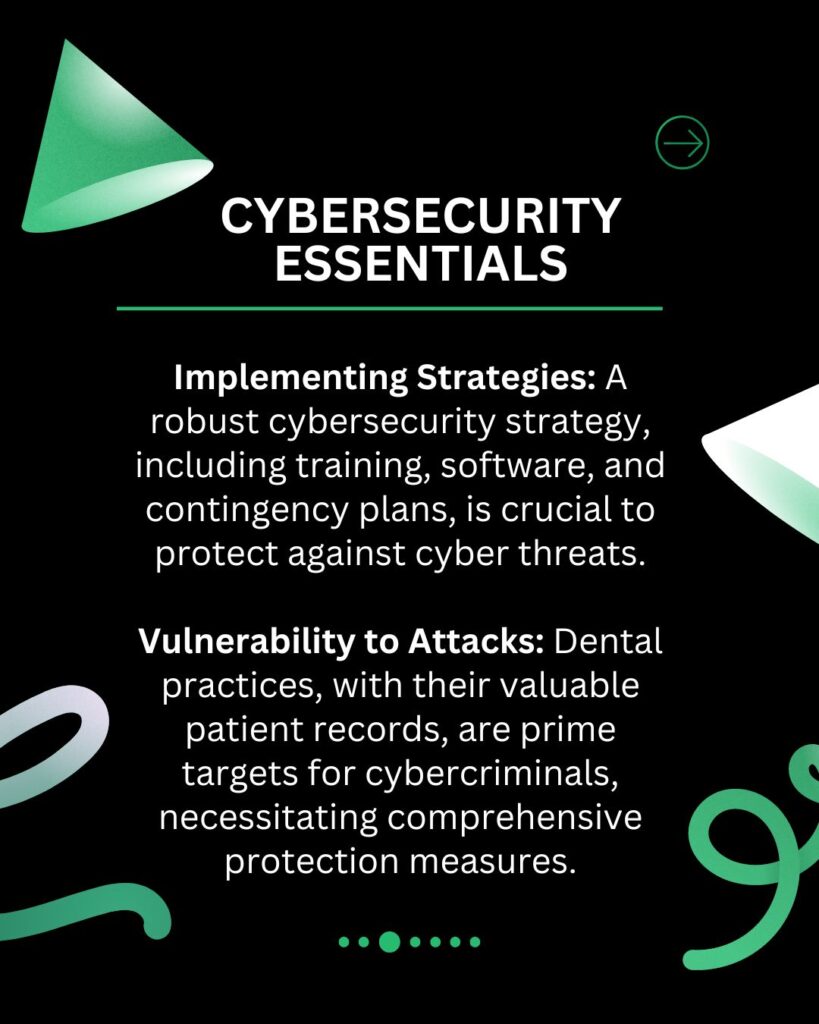
The human firewall
Unfortunately, it’s not just external factors that put your sensitive data at risk. Human error is one of the biggest factors in data loss.
Every business needs to train their employees to protect the business and its clients from attack. With the right training on how to identify, prevent and respond to cyber threats, your staff become the first line of defence in your business – a human firewall.
However, they may not spot everything, they may be faced with a problem they haven’t been trained to solve, or they may simply make a mistake.
Whatever the reason, there may well come a time when your business is successfully attacked, despite your best efforts.
When this happens, the second line of defence steps in – our antivirus software.
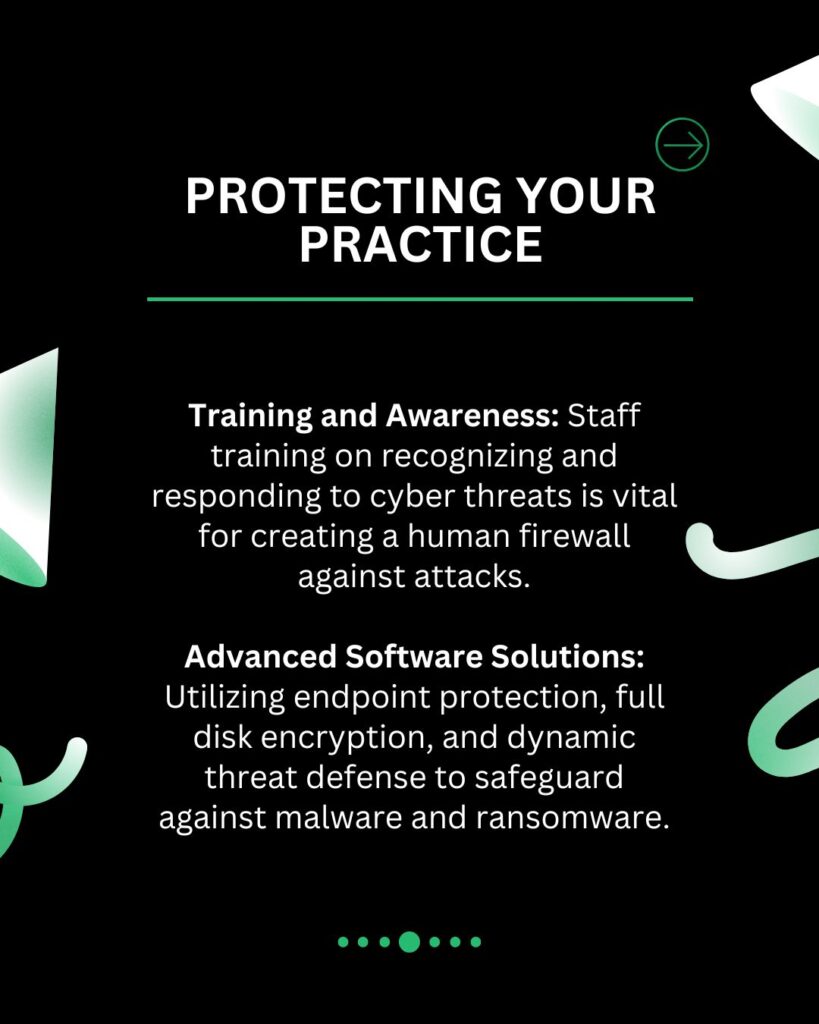
Antivirus software
The antivirus software we use is more than just the standard software that comes with every new laptop or desktop computer.
We use a 3-pronged approach to keep your data and digital records safe:
- Endpoint protection (a pro-active antivirus software which not only blocks incoming attacks, but seeks out and destroys any existing or hidden malicious software)
- Full disk encryption (this is the process of obscuring your most sensitive data by rewriting it in a specific code, to which only those you designate will have access)
- Dynamic threat defence (an anti-virus software which recognises any suspicious software and isolates it to be analysed – meaning you are protected even from brand-new malware that isn’t recognised as malicious yet).
Combined, these 3 defences can help ensure your business is as protected online as it can be.
But what happens if your first 2 lines of defence are breached?
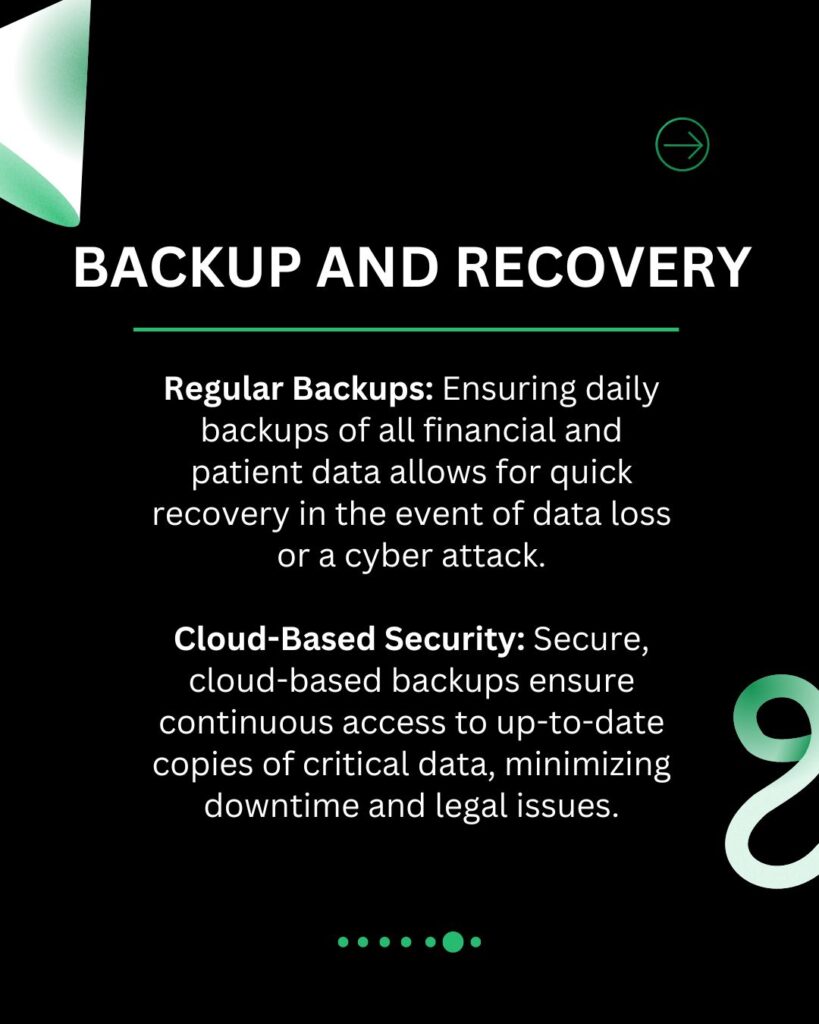
Backing up your data
If something happens to your data, whether it be destroyed or stolen, our backup service can ensure you can recover and access the lost information.
Our backups only take a matter of hours at most and are run on a daily basis. This means that if anything happens to your data today, you can recover it as it was on the last backup that morning.
Aside from providing the proper software to protect your practice from the frontlines, including the training to use it, we also keep your data backed up and protected on secure cloud servers.
Our server creates regular and secure copies of your servers to make sure you also have access to the most recent copies of your data, information and records.
From financial data, personal information and your patient records, we make sure you do not face needless downtime and even legal issues while trying to recover data or fight cybercriminals.
With our safe, virtual, cloud-based copies of your servers, you can simply flip a switch and recover your latest daily backup easily, quickly and safely.
Action Points
- Implement a comprehensive cyber security strategy for your dental practice.
- Train your team on how to recognize, respond to, and resolve cyber threats effectively.
- Invest in advanced antivirus software, including endpoint protection, full disk encryption, and dynamic threat defense, to protect your data from malware and cybercriminals.
- Ensure regular, secure backups of all your financial and patient data to recover quickly in case of data loss or cyber-attacks.
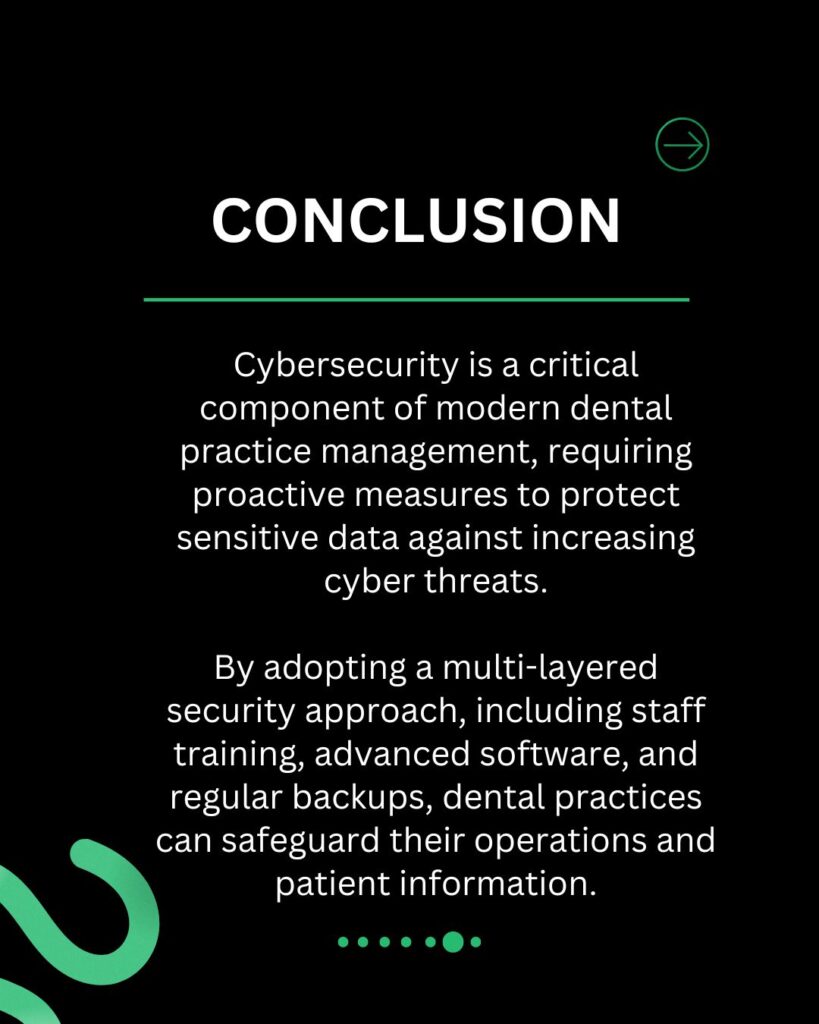
How to keep your dental practice protected online FAQ
Why is online protection important for a dental practice?
Online protection is crucial for a dental practice to safeguard patient data, maintain trust, comply with legal requirements like GDPR, and prevent cyberattacks that could disrupt operations.
What are the main cybersecurity risks for dental practices?
Common risks include data breaches, ransomware attacks, phishing scams, and malware, all of which can compromise patient information and the practice’s financial and operational integrity.
How can dental practices protect patient data online?
Dental practices can protect patient data by using encryption, secure passwords, firewalls, two-factor authentication, and regularly updating software to guard against vulnerabilities.
What is GDPR and how does it affect dental practices?
GDPR (General Data Protection Regulation) is a legal framework that requires dental practices to protect personal data, ensuring patient privacy and giving individuals control over their information.
What steps can a dental practice take to prevent a data breach?
To prevent data breaches, dental practices should implement strong password policies, regularly update software, use encryption, train staff on cybersecurity best practices, and conduct regular security audits.
What should dental practices do if they experience a cyberattack?
In the event of a cyberattack, dental practices should immediately contain the breach, inform relevant authorities (such as the ICO in the UK), notify affected patients, and work with cybersecurity professionals to resolve the issue.
How can dental practices ensure secure online communications with patients?
Dental practices should use encrypted communication platforms, secure email services, and patient portals that meet privacy standards to ensure that sensitive patient information is shared securely.
What software can help protect a dental practice online?
Anti-virus software, firewalls, encrypted email platforms, and cybersecurity monitoring tools can help protect a dental practice by detecting and preventing cyber threats in real-time.
How often should dental practices update their cybersecurity measures?
Cybersecurity measures should be reviewed and updated regularly, at least annually, or whenever new threats emerge. This includes updating software, reviewing security protocols, and providing staff with regular training.
Why is staff training important for online security in dental practices?
Staff are often the first line of defence against cyber threats. Regular training helps them recognise phishing attempts, use secure passwords, and follow protocols to prevent accidental data breaches.
What role does encryption play in protecting dental practice data?
Encryption ensures that any data, whether stored or transmitted, is secure and unreadable to unauthorized parties. It’s essential for protecting patient records and financial information.
Can dental practices outsource their cybersecurity needs?
Yes, dental practices can outsource their cybersecurity to specialized IT firms, which offer services like monitoring, data protection, and incident response to ensure the practice remains secure.
How does two-factor authentication enhance security for dental practices?
Two-factor authentication (2FA) adds an extra layer of security by requiring not just a password but also a second verification step (like a code sent to a phone), making it harder for hackers to gain access.
What legal obligations do dental practices have for online security?
Dental practices are legally required to protect patient data under laws like GDPR. This includes implementing appropriate cybersecurity measures and reporting any data breaches to authorities within 72 hours.
How can I ensure my dental practice’s website is secure?
Ensure your dental practice’s website uses SSL certificates (HTTPS), regularly updates security software, and is hosted on a secure server to protect patient information and prevent cyberattacks.
Get Started: Cyber Security for Healthcare
Cyber security is an essential part of keeping your patients, data and business protected online.
With Samera Cyber Security, you get the tools you need, the know-how to use them and digital copies of all your data. This three-pronged approach means you can keep your business safe and your data safe.
Contact us today to find out more about how our cyber security training, digital protection products and back-up contingencies can help you.
Make sure you never miss any of our articles, webinars, videos or events by following us on Facebook, LinkedIn, YouTube and Instagram.



